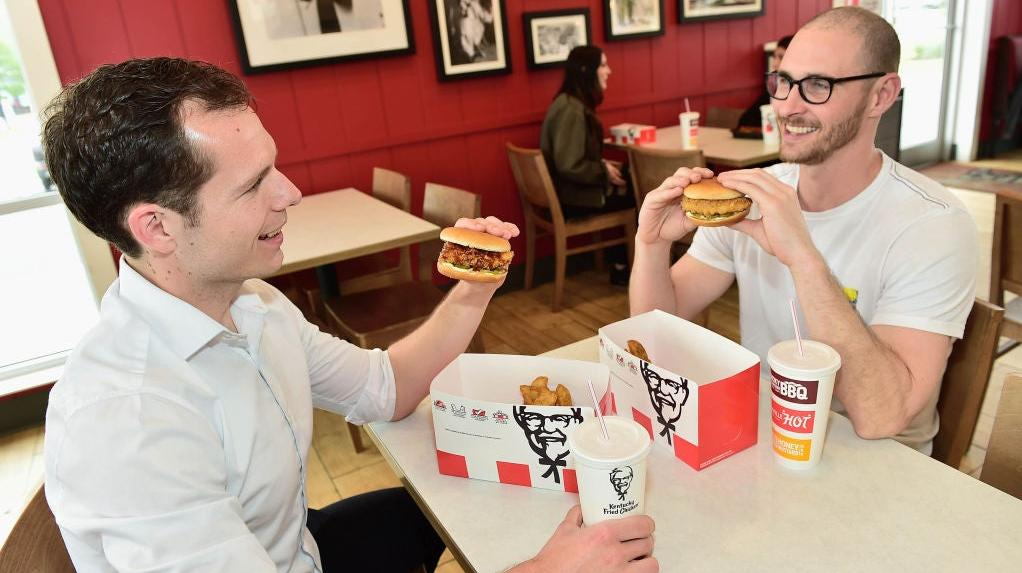Why You Should Be Skeptical Of 'Progressive' Fast Food Chain Promises
Cage-free eggs here, compostable packaging there—does any of it actually make a difference?
I'm really not a cynical person. I take a pretty rosy view of most people, places, and institutions until I have reason to believe otherwise. At least, I used to; that approach has receded a bit in the last two years, as I've shed pretty much every illusion that the powers that be have my well-being in mind. But, hey, Panda Express just announced its commitment to using only cage-free eggs! Things are looking up, right?
Meh. Not so fast. The chain's new cage-free initiative is a fine step—but the announcement has re-ignited my general skepticism of fast food chains' "progressive" promises. These days, I take major food companies' lofty statements with a big, fat, corn-sized grain of salt. I think you should, too. But first, some background on the cage-free promise.
Cage-free eggs are an improvement—right?
Earlier this week, Panda Express announced a new "global cage-free animal welfare policy." Specifically, the brand committed to sourcing 100% of its eggs and egg products from cage-free facilities. (The chain announced a similar policy in 2020, but it's just now receiving global implementation.)
With this move, Panda Express joins other fast food and quick-service restaurants (QSRs) ending their support of battery cages, the tiny, 67-square-inch cages that confine chickens raised for commercial egg production. In 2015, both McDonald's and Dunkin' announced plans to source 100% cage-free eggs by 2025. Yum! Brands—the giant restaurant company behind brands like Pizza Hut, Taco Bell, and KFC—also pledged to go 100% cage-free globally last year.
To be clear: I'm in favor of cage-free eggs. I really am. But cage-free doesn't necessarily mean cruelty-free. Please make no mistake: These commercially-raised chickens will not be pasture-raised in a bucolic setting. There's still a lot of cruelty associated with commercial egg production, and, as we've discussed before, the term "cage-free" really just means the hens aren't kept in cramped cages. That doesn't mean they'll have access to the outdoors.
Why I don’t trust fast food companies
Here at The Takeout, we receive a lot of press release emails. Like, dozens of them in the span of a single day. A lot of those emails have subject lines boasting "green," "healthy," or "better-for-you" initiatives—and those are typically the emails that I plunk directly into the trash. In the vast majority of cases, promotions like these serve one purpose: to artificially boost a company's "ethical" public profile and, thus, its profit margins.
Take, for example, the buzzy compostable food packaging you'll see at quick-service concepts like Sweetgreen. While the company did roll out improved compostable packaging in 2020, that kind of biodegradable packaging is not recyclable. That leaves consumers with two options: compost the packaging or trash the packaging. Which one do you think works best for the majority of consumers?
Meanwhile, McDonald's is leaning into a slew of sustainability initiatives—climate experts are consistently begging consumers not to fall for the claims. Last year, The Guardian quoted Gidon Eshel, an environmental and urban studies research professor at Bard College. "The naked truth is McDonald's is in a business that is fundamentally at odds with the Earth's integrity," said Eshel. "No fig leaf, however persuasive or covering it is, can change that fact."
That's all these initiatives are: fig leaves. At the end of the day, fast food companies do not care about the consumers they're feeding, nor do they care about the welfare of the animals they're feeding to consumers. They care about one thing: profit.
One more thing: I'm certainly not calling for a worldwide boycott of fast food companies. A lot of the population relies on fast food for its affordability and accessibility, especially in food deserts and other areas where access to fresh food proves challenging. I'm simply asking you, the consumer, to adopt a healthy amount of skepticism when dealing with these operations. If a fast food company rolls out a promising new initiative, ask yourself: does this really mean anything? In most cases, the answer is no.
